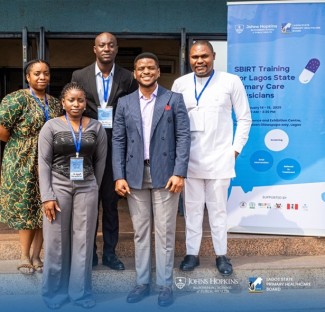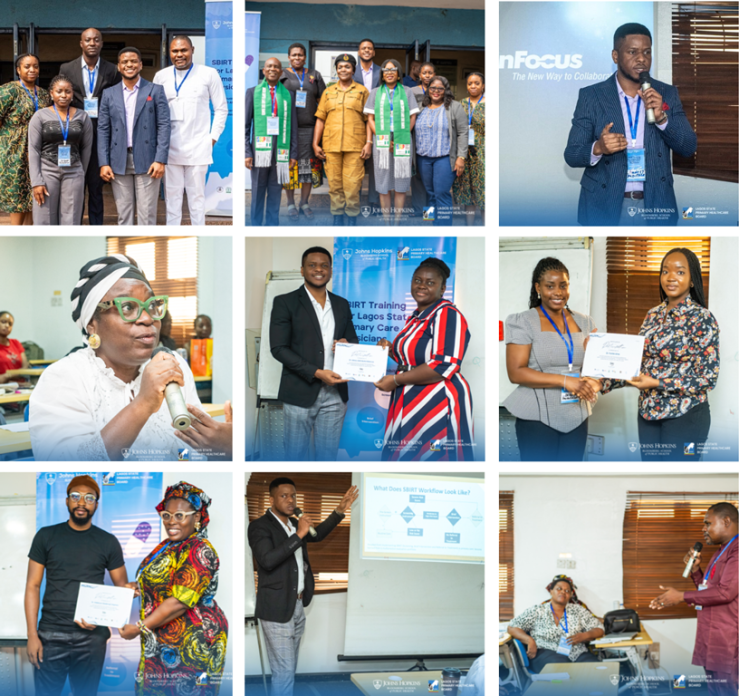Transforming Primary Care in Lagos: How SBIRT Training is Addressing Nigeria's Substance Use Crisis

Breaking barriers and building capacity in Africa's most populous city.
Nigeria remains one of the most affected countries with substance use disorders in sub-Saharan Africa. In Lagos State alone, with over 20 million residents, the burden on healthcare systems is immense. Yet until recently, most primary care physicians, who are often the first point of contact for millions, have lacked the tools and training to effectively address substance use disorders.
This critical gap, explicitly highlighted in Nigeria's National Drug Control Action Master Plan (2021-2025) as a strategy under demand reduction, prompted our team to implement this ground breaking initiative: training primary care physicians across Lagos State using a culturally tailored, evidence-based Screening, Brief Intervention, and Referral to Treatment (SBIRT) model.
Why SBIRT? Why Now?
The numbers tell a sobering story. Pre-training assessments revealed that only 9.1% of Lagos primary care providers had received formal training in substance use screening, and nearly 79% were unfamiliar with national substance-use policies. Meanwhile, patients engaging in unhealthy and illicit substance use were presenting to these same clinics daily, going unidentified.
Perhaps most concerning, despite all respondents feeling they played a part in assessing substance use disorders, 36.4% believed all cases should be referred regardless of severity, revealing a critical gap in understanding appropriate intervention levels. Even more troubling, 18% of providers viewed substance use disorders as moral failings, while another 21.2% weren't certain whether they were medical conditions or character flaws.
SBIRT offered a practical solution: a structured approach that transforms routine healthcare encounters into opportunities for early detection, brief intervention, and appropriate referral. Rather than waiting for patients to reach crisis points, SBIRT empowers healthcare providers to screen universally, intervene early, when interventions are most effective and cost-efficient.
Building Bridges: Stakeholder Engagement
The success of our initiative hinged on unprecedented collaboration. Key partners included the Johns Hopkins Bloomberg School of Public health, Lagos State Primary Healthcare Board, Nigerian Medical Association, the Inter-ministerial Committee for Drug Abuse Control, the National Drug Law Enforcement Agency (NDLEA), National Agency for Food and Drug Administration and Control (NAFDAC), and International Society of Substance Use Professionals (ISSUP), SMART Recovery Global–Nigeria, Resurgence Recovery Centre. This multi-sector approach ensured that training wasn't delivered in isolation but was embedded within existing healthcare structures and policy frameworks.
The Training: More Than Knowledge Transfer
Our comprehensive training program went beyond technical skills. Interactive sessions addressed:
- Implemented Policy Gap: For the first time, we operationalised a policy gap–integrating substance use prevention into PHC, translating it to practice.
- Cultural context: Understanding substance use patterns, standardizing alcoholic beverages to understand consumption and recommended limits specific to Lagos and Nigeria
- Scientific foundation: Neurobiology of addiction to combat misconceptions
- Stigma and Discrimination: Shifting perspectives from moral judgment to medical understanding
- Practical tools: Hands-on training with validated screening instruments that identifies prevalent substances in our communities TAPS, AUDIT & ASSIST
- Communication skills: Brief Negotiated Interview–Motivational interviewing technique, appropriate for primary care setting for sensitive conversations
- Resource mapping: Local referral networks and treatment options, establishing partnerships with the international society for substance use professionals
The interactive format, featuring roleplay scenarios and case discussions, ensured participants could immediately apply their learning.
Looking Forward: Sustainability and Scale
Our participants identified several implementation challenges, including high workloads and limited technical support. Our response includes streamlined workflows involving multiple healthcare team members and strengthened referral networks.
The broader vision extends beyond Lagos. This model demonstrates how evidence-based interventions can be successfully adapted to African healthcare contexts, offering a blueprint for other states and countries facing similar challenges.
A Personal Reflection
As an addiction medicine physician working in Nigeria, I've witnessed first hand the devastating impact of unidentified substance use disorders on individuals, families, and communities. This SBIRT initiative represents more than training, it's about fundamentally changing how we approach addiction in primary care settings.
The enthusiasm and commitment shown by our Lagos colleagues gives me hope. When healthcare providers are equipped with the right tools and knowledge, they become powerful agents of change. Every patient screened, every brief intervention delivered for those identified with at-risk patterns, and every appropriate referral made represents a life potentially saved and a community strengthened.
About the Author

Dr. Honest Anaba, MBBS, MPH, FASAM, is a Fellow of the American Society of Addiction Medicine and Team Lead of this SBIRT Pilot project, supported by the J.B Grant field award, Johns Hopkins Bloomberg School of Public Health. As a certified Addiction Medicine physician, he serves as Clinical Director of Resurgence Recovery Centre and on international committees with the International Society of Addiction Medicine and American College of Academic Addiction Medicine. Dr. Anaba has pioneered addiction treatment integration and is a recognized expert in translating global best practices into culturally appropriate interventions across the region.
For more information about SBIRT implementation or to explore similar initiatives in your region, contact Dr. Honest Anaba through ISSUP Nigeria.
